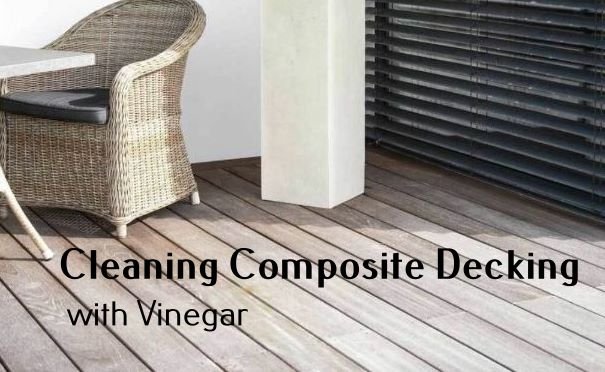In recent years, composite decking has become a popular choice among homeowners for its durability, low maintenance, and elegance. This material allows homeowners to enjoy the beauty of their decks without spending too much time on upkeep.
However, this material requires occasional maintenance, and cleaning composite decking with vinegar has been one of the most effortless cleaning methods.
Homemade Deck Cleaner Vinegar
While many commercial deck cleaning solutions are available, they often contain harsh chemicals that can harm plants and children. As an alternative, a homemade vinegar solution is safer and more effective.
It’s important to avoid hazardous cleaners, especially in homes with children. You can easily create your own eco-friendly composite deck cleaner using common household ingredients.

A vinegar mixture serves as an ideal natural cleaning solution for composite decking.
Read also: Cleaning Decking with Bleach: How to Do It? Is It OK for Your Deck?
Here is how to make a homemade decking cleaner from vinegar:
- Mix a gallon of warm soapy water with a cup of white vinegar to make a homemade decking cleaner. This mixture effectively cleans deck boards and is a natural choice for removing water stains.
- Alternatively, pour two cups of white vinegar directly onto the affected areas for tougher stains.
- Apply the cleaning solution without a pressure washer or sprayer. Simply use a paintbrush, dip it into the mixture, and brush it over the stains.
- Let it rest for about 10 to 15 minutes, and use a stiff broom to brush it before rinsing it with clean water; gently scrub each deck board with a soft bristle brush to remove dirt and debris before rinsing the decking with a garden hose.
Cleaning with vinegar is beneficial for several reasons:
Eco-Friendly and Safe: Vinegar is a natural, non-toxic cleaning agent, making it safe for use around children, pets, and plants. Unlike some chemical cleaners, it doesn’t pose a risk to the environment.
Effective Against Mildew and Mold: Vinegar is acidic, which makes it effective at killing mold and mildew. These are common issues on decks, especially in damp or shaded areas. Regular cleaning with vinegar can prevent the buildup of these fungi, which can cause structural damage to the deck and health problems for individuals with allergies or respiratory issues.
Cost-Effective: Vinegar is a budget-friendly option compared to many commercial deck cleaners. It’s a common household item, which means you might already have it in your pantry, eliminating the need for an extra purchase.
Cleaning Deck with Vinegar and Baking Soda
For tougher mold and mildew, create a stronger solution by adding a cup of baking soda and a few drops of liquid dish soap to the vinegar and water mix.
Mold and mildew are common problems on decks. These fungi can damage the structure and pose health risks.
Health issues from mold and mildew include heart disease, respiratory problems, fatigue, migraines, and joint pain.
Symptoms like sneezing, coughing, and skin, eye, and throat irritation can occur in those allergic to mold. Removing mold and mildew from your deck is crucial, and it’s not a difficult process. Here is how to do it:
- Start by spraying your deck to remove snow and as much mold as possible, using a power washer if available.
- Add two cups of household vinegar and one gallon of clean water in a large bucket. Apply the cleaning solution over the moldy areas and sprinkle it with baking soda.
- Let them sit for around 20 minutes, then use a bristle brush to gently scrub the stained area until you remove the excess mold and mildew. Rinse the area with clean water.
Read also: How to Remove Mold from Attic Plywood
While cleaning composite decking using a vinegar is not the most effective cleaner, it is the most eco-friendly solution. You can use it to remove easy-to-clean stains on your deck area without causing any damage to nearby plants.


